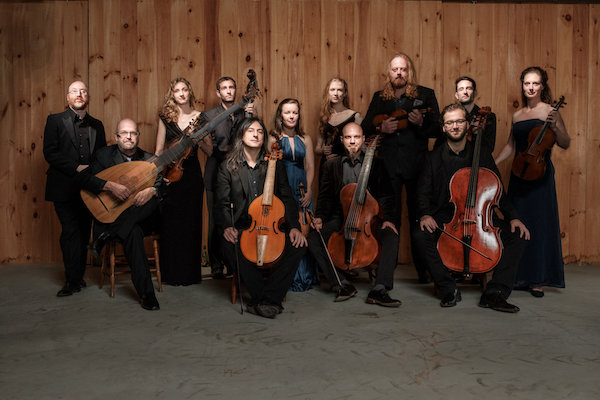ACRONYM fetes music of the gifted Düben family in style

The Düben collection, housed at Uppsala University in Stockholm, consists of some 2,300 manuscripts of musical compositions collected by the Düben family of musicians who served as Kapellmeisters to the Swedish Court from the late 16th to mid-18th centuries.
That is an enormous amount of music, most of it unknown. Its very existence speaks to both how music making is at the core of human culture and that the early music movement still has so much that’s new to present to the world.
Sunday afternoon, ACRONYM played a small but generous selection of this music. The concert, at Corpus Christi Church, was the first event of the season for Music Before 1800. It was also one of a series of concerts presented this month by “New York City Early Music Celebration 2019: Ex Borealis” an exploration of early music from Scandinavia.
ACRONYM is expert in this music. They’ve included pieces from the collection in two of their recordings, and continue to explore the manuscripts. What they brought out for Sunday’s concert was eleven works, four sonatas a6 and seven devotional vocal works.
There was to be more, but in a pre-concert announcement, the ensemble admitted they had “radically underestimated” the duration of the performance, and so cut out a vocal work from Giacomo Carissimi and also one by Christian Ritter. Of those, Carissimi is a name we can find on occasion, and for the rest, the most well-known composer was Johann Schmelzer; aficionados may be familiar with Samuel Capricornus. The remaining figures are mostly lost to time.
But their era survives. This was music that predates Bach and Vivaldi, and the performances brought out the best of the music with style and rhythmic panache. ACRONYM mixes strings with theorbo and keyboard and with cellos and ur done, the group laid down a muscular continuo, with violins and violas gliding and bright on top. The group played with verve throughout.
An excellent quartet of singers added color and character; soprano Hélène Brunet, alto Reginald Mobley, tenor Brian Giebler, and bass Jonathan Woody. As an ensemble they essayed pieces from Johann Philipp Krieger, Christian Geist, and the concluding Ich Kann nicht mehr, a moving, earthy dialogue between the soprano—who sings “No longer can I… “—and bass—who responds—Yes, you still can”—by Daniel Eberlin.
That kind of “Who’s that?” experience was an example of the serendipity of this concert program. This was all fine music, elegant in the direct manner of the German baroque, with invention coming through eccentricities (and flaws); Eberlin (who was also a soldier and an administrator) ended his piece with a fugue on “Amen,” while Andreas Kirchoff’s Sonata in G-minor was packed with dance rhythms, though the form was a little hazy.
Those individual quirks in no small part meant this music was sidelined in a history dominated by the grandest names, and their legacies. But taken as a group, as on Sunday, they captured the sound of the extended Düben family.
This came through most strongly in the vocal music. Each singer had a solo feature, and the plainspokenness of music and text was refreshing and vibrant. Giebler sang Radeck’s Herr wenn ich nur dich habe with a sunny devotion, and Mobley, with his exquisite tone, sang Inter brachia Salvatoris mei, by Christian Flor. An intensely pithy piece—the entire text is one sentence—at the end the singer extends “mori” through twists and turns, and when Mobley closed the final articulation of the word “die,” the music just stopped.
Mobley and the other men (Woody sang Capricornus’ Salvum me fac Deus) had such fine articulation that the Latin and German needed no translation, the meanings were pure and clear. Brunet’s performance of Caterina Giani’s Liebster Jesu, trautes Lebr had a lovely sound but was a bit hazier than the other vocal numbers.
Though one never lost sight of the setting, the whole felt like the recovery of a moment in time, when people gathered at the court to hear what the Kapellmeister had just created.
Capella Pratensis sings Jacob Obrecht’s Missa Maria Zart, 4 p.m., October 27. mb1800.org






